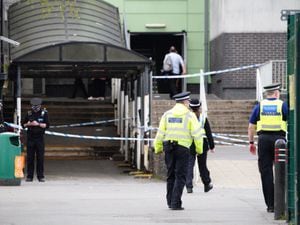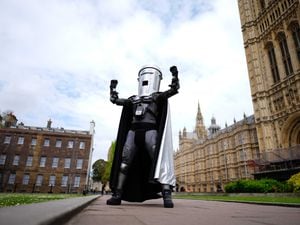Delay to Brexit must be ‘useful’ to get EU approval, says negotiator
Theresa May is due to ask for an extension to talks beyond March 29 at Thursday’s summit of EU leaders in Brussels.
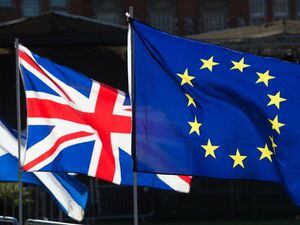
The European Union will need to know “the reason and the usefulness” of any UK request to delay Brexit before deciding whether to grant an extension, the EU’s chief negotiator has said.
Theresa May is due to write by the end of Wednesday to European Council president Donald Tusk, setting out her proposal to extend the two-year process.
But a delay beyond the scheduled date of March 29 needs the approval of all 27 remaining member states at a summit in Brussels on Thursday.
Chief negotiator Michel Barnier told a news conference in Brussels: “It is our duty to ask whether this extension would be useful because an extension will be something which would extend uncertainty and uncertainty costs.”
He warned that the UK would need to propose “something new” to justify a lengthy extension.
Unconfirmed reports suggest that Mrs May could ask for a lengthy extension to Article 50, with the option of an early break in May or June if she manages to get her Withdrawal Agreement through Parliament.
But Mr Barnier poured cold water on this option, saying: “Both short and long. Well, it’s either one or the other, isn’t it?”
He added: “My feeling is … a longer extension needs to be linked to something new.
“There needs to be a new event or a new political process.”
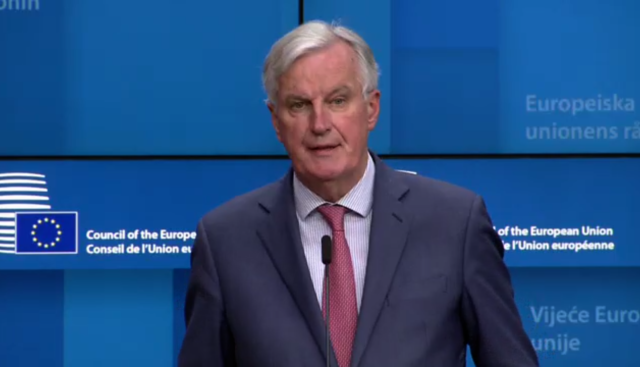
Irish foreign minister Simon Coveney said the UK would need to provide a “very persuasive plan” to support any request for a long extension to the Article 50 negotiation process.
He told reporters in Brussels: “If there is going to be a request for a long extension of Article 50 by the UK then there will need to be a very persuasive plan to go with that to explain why that’s needed and how they will use the time to conclude the outstanding issues that haven’t been able to be agreed in London in the context of the Brexit process.”
If the EU agrees an extension, Brexit will be delayed by the passage of a statutory instrument through both Houses of Parliament removing the date of March 29 from the legislation.
MPs will be given an opportunity in the House of Commons on Monday to debate how the process should go forward.
Labour leader Jeremy Corbyn indicated that this will be the point to challenge the Government.
Speaking after talks with other opposition parties and Labour backbenchers on the way forward, Mr Corbyn said: “If the Government can’t get a majority for its way on Monday, then I think that’s the time to challenge this Government.
“The reality is that this Government has lost its authority, doesn’t enjoy the confidence of the House, can’t get anything through. Surely that is the time to step aside and let the people decide in a people’s vote that’s called a general election.”
He added: “I hope that on Monday the House will come together and support some sensible alternatives that can be negotiated during an extension period with the EU.”
At a meeting of Cabinet in Downing Street, Mrs May voiced her “absolute determination” that MPs should have another chance to vote on her Brexit deal, despite the bombshell intervention of the Commons Speaker.
John Bercow provoked uproar at Westminster on Monday when he ruled that the Government cannot bring the Prime Minister’s deal back for a third “meaningful vote” without substantial changes.
But Mrs May told Cabinet she wanted MPs to have another vote “as soon as possible”.
The Prime Minister’s official spokesman said: “What you can see from the Prime Minister and her colleagues is an absolute determination to find a way in which Parliament could vote for the UK to leave the European Union with a deal.”
Nevertheless, there was said to be concern among some ministers that Brexit appeared to be slipping away.
The Leader of the House Andrea Leadsom is understood to have told the meeting: “This used to be the Cabinet that would deliver Brexit and now from what I’m hearing it’s not.”
German Chancellor Angela Merkel said Brexit was in a state of “flux” and that EU leaders will “try to react” to whatever Mrs May proposes on Thursday.
Mrs Merkel appeared bemused by Mr Bercow’s decision to block a fresh vote on the basis of a convention dating back to 1604.
Speaking in Berlin, she said: “I’ll concede that I wasn’t actively aware of the British Parliament’s rules of procedure from the 17th century, so I took note of this with interest yesterday.”
Downing Street confirmed discussions were continuing with the Democratic Unionist Party, which props up the Government at Westminster, in an effort to build support for the deal after last week’s 149-vote defeat.
And Mrs May held talks on Brexit with former foreign secretary Boris Johnson, one of the most strident critics of her Withdrawal Agreement.
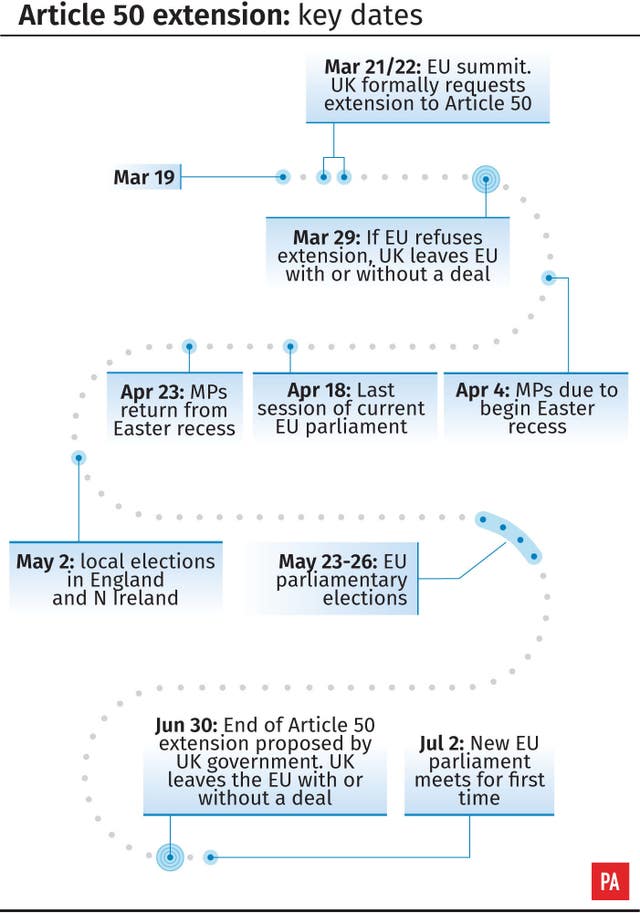
With just 10 days to go before Britain is formally due to leave, there was exasperation among the EU27 over the continued deadlock in Westminster.
Arriving for a meeting of EU foreign ministers in Brussels, Germany’s Europe minister Michael Roth said: “Dear friends in London, please deliver. The clock is ticking.
“It’s not just a game. It’s an extremely serious situation.”
Meanwhile, Mr Tusk met Irish premier Leo Varadkar in Dublin to discuss the backstop arrangement which both the EU and Ireland insist is necessary to keep the border open.
In a joint statement, they said Mr Tusk had expressed “strong and ongoing solidarity” with Ireland and they had agreed they needed to see what proposals would now emerge from London.

